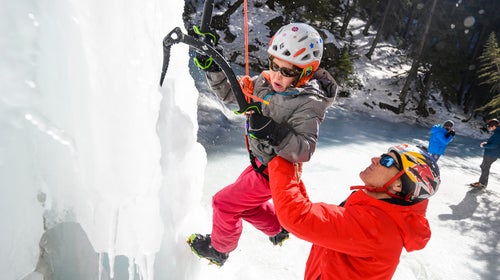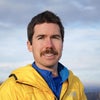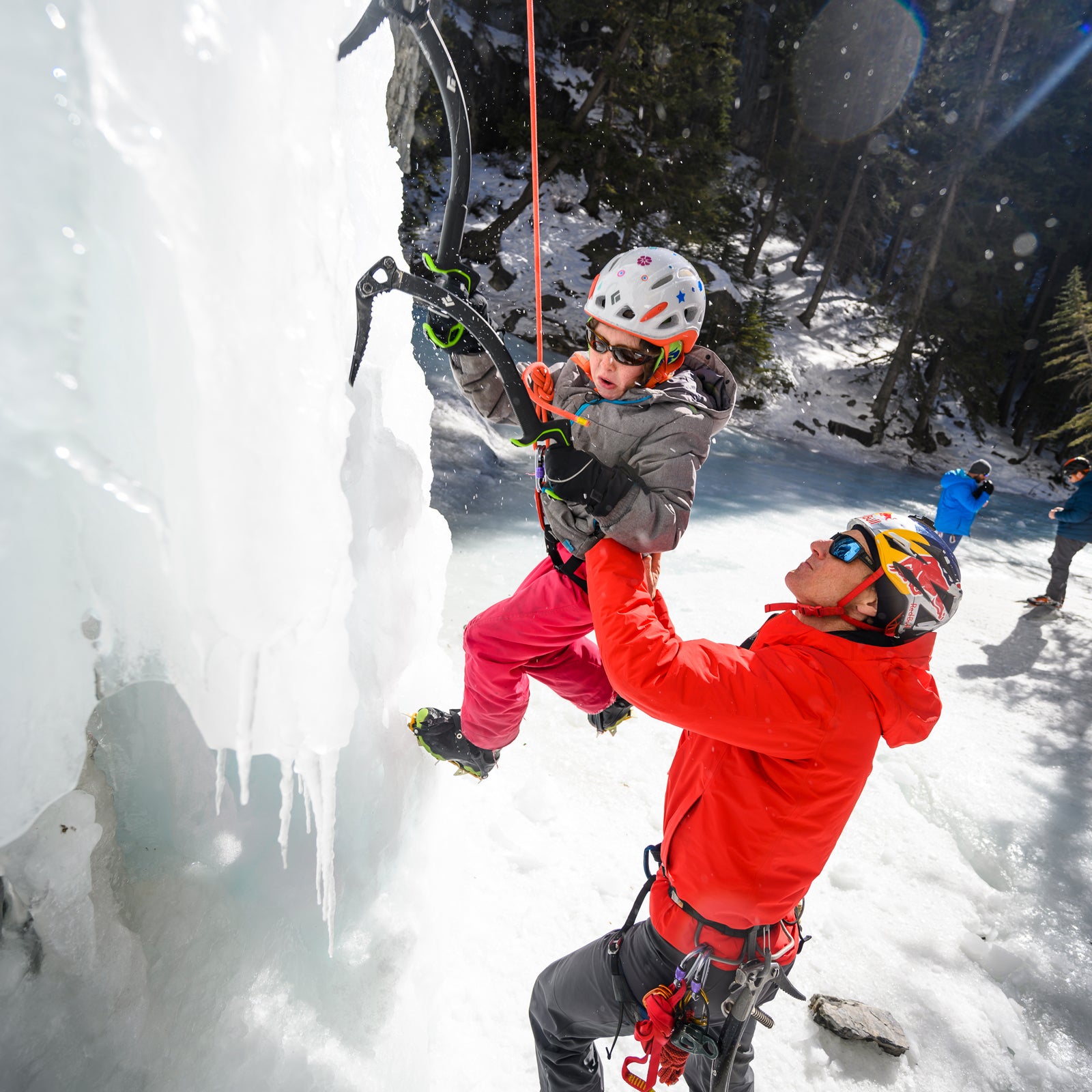In the Canadian Rockies, up a narrow canyon, eight-year-old Rose sits on her pack in the snow. Next to a sled full of gear, she works the straps on her crampons��with a little help from her dad. Rose’s older sister, Marie, 11,��sits nearby and fits her own crampons. They’re in Grotto Canyon, near their hometown of Canmore, Alberta, and they’re here for the ice.
This may be a normal day out for the girls—it’s Marie’s third time��and Rose’s second time ice climbing—but their father, professional climber��Will Gadd, certainly does not have a normal career. Despite making a living through dangerous feats��like��establishing some of the world’s hardest ice and mixed climbs, sending a frozen Niagara Falls, and setting the distance world record for paragliding (twice), he hasn’t reached the ripe��old age of 52 without knowing a thing or two about risk management. On under career highlights, he proudly lists “surviving.”
Gadd and his kids try to go on one adventure every weekend, not only because they love it, but also because it teaches the girls how to assess and manage risk in the outdoors, a skill that Gadd hopes��they will carry over to everyday life. Risk management, however, isn’t about eliminating risk altogether—an impossibility in any facet of life—but recognizing��potential hazards and mitigating��the consequences, or knowing when to bail.
With her crampons on, Rose pops up and asks her dad if she can sled while she waits to climb. Gadd replies, “What’s going to happen when you get in the sled with crampons on?”
Rose looks at the sled for a moment, and then her feet, and then back to the sled. “I poke holes in it,” she says. “I’ll just go practice.” She picks up a pair of ice tools��and, stomping her feet to set the crampons, duck-walks over to the frozen river to work on her swing.
“OK, Rosie,”��Gadd��says. “Just keep the pointy bits away from your eyes.”
Parenting is a lot like guiding,��and vice versa, Gadd says. “When you’re taking care of people in the mountains, regardless of their age, you’ve got to set realistic goals, keep them warm and fed, and make sure the risks you’re taking are appropriate.”
As for the latter, he classifies risk into three general tiers based on the potential consequences: bumps and bruises, hospital, and death. He uses the same system��whether guiding or out with his girls, but his girls were the ones who came up with the names. When they reach a hazard, like the base of a cliff, together they assess the danger. They run through scenarios—what would happen if this, or what would happen if that—and then come up with ways to manage or work around those hazards. If the risk is too high for the girls’ experience or ability level, they’ll walk away. “I’m not trying to scare my kids by pointing out there is potential for death and hospital and bruises out there,”��Gadd��says. “I’m trying to get them to identify the real problems, and then they’re free to explore the spaces between them.”
He is Socratic in his approach. Like with Rose and the sled, Gadd rarely tells his girls to not do something��but will instead phrase a concern as a question to encourage critical thinking. “The goal is to turn them into autonomous people, right?” he says. “I think there’s this overemphasis on developing confidence in kids, but if you develop confidence without competence, it leads to beatdowns and danger. I like to boost their competence, and I hope confidence will follow.”
As Marie and Rose take turns climbing laps on the ice flow, a hiker approaches the cliff to take photos. “Dad,” Marie says, “that woman is standing in a dangerous place.”
Immersed in her camera, the hiker is oblivious to the fact that the top of the cliff is now in full sunlight on an unseasonably warm day. Any loose rock that had frozen in place over the winter could come unglued at any moment. The ice climb itself is protected by a section of overhanging rock, but a few feet out from the base of the cliff is a brown ring of pebbles and stones, exactly where the woman stopped. Stand there without a helmet for too long, and you might be riding the hospital train.
“Kids are more capable than we give them credit for,”��Gadd��says. “They’re pretty good at recognizing these situations��if you let them develop that skill.” But he’ll also admit there’s a learning curve. Kids make mistakes, they get bumps and bruises from time to time, and that’s OK��in the right circumstances. “That’s what they’re supposed to do—they’re kids,” he says. “That’s how they learn.” Finding that balance between acceptable or healthy risk and serious danger is the crux for any parent.
The day continues to warm beyond Gadd’s comfort level for ice climbing—the object hazard rises above his acceptable level of risk for his kids—and so the team switches gears to sport number two. Gadd had hauled up ice skates in the sled. All three are itching to play on the angled and undulating ice of the canyon floor—something they have never tried before. Rose is first out on the ice. She takes a few hesitant strides, stumbles once or twice, and then in no time is ripping around in circles with confidence well beyond her years.
“However people want to raise their kids, right on. But for me, I think it’s important that they develop a sense of adventure and risk management at an early age,”��Gadd��says. “If I don’t teach them how to do that on their own��now, then they won’t be able to do that on their own later.
“I’m hoping when, say, Marie is 16, and she’s contemplating getting into a car with somebody who has been pounding beers, she can look at that situation��and make the right decision.”
At the end of the day, the sled loaded with packs and Rose and Marie sitting on top, Gadd takes the reins. “Helmet check!” he says. The girls both slap the top of their helmets twice with their mittens, and then they’re off, down the canyon and out of the mountains, without any bumps or bruises.


